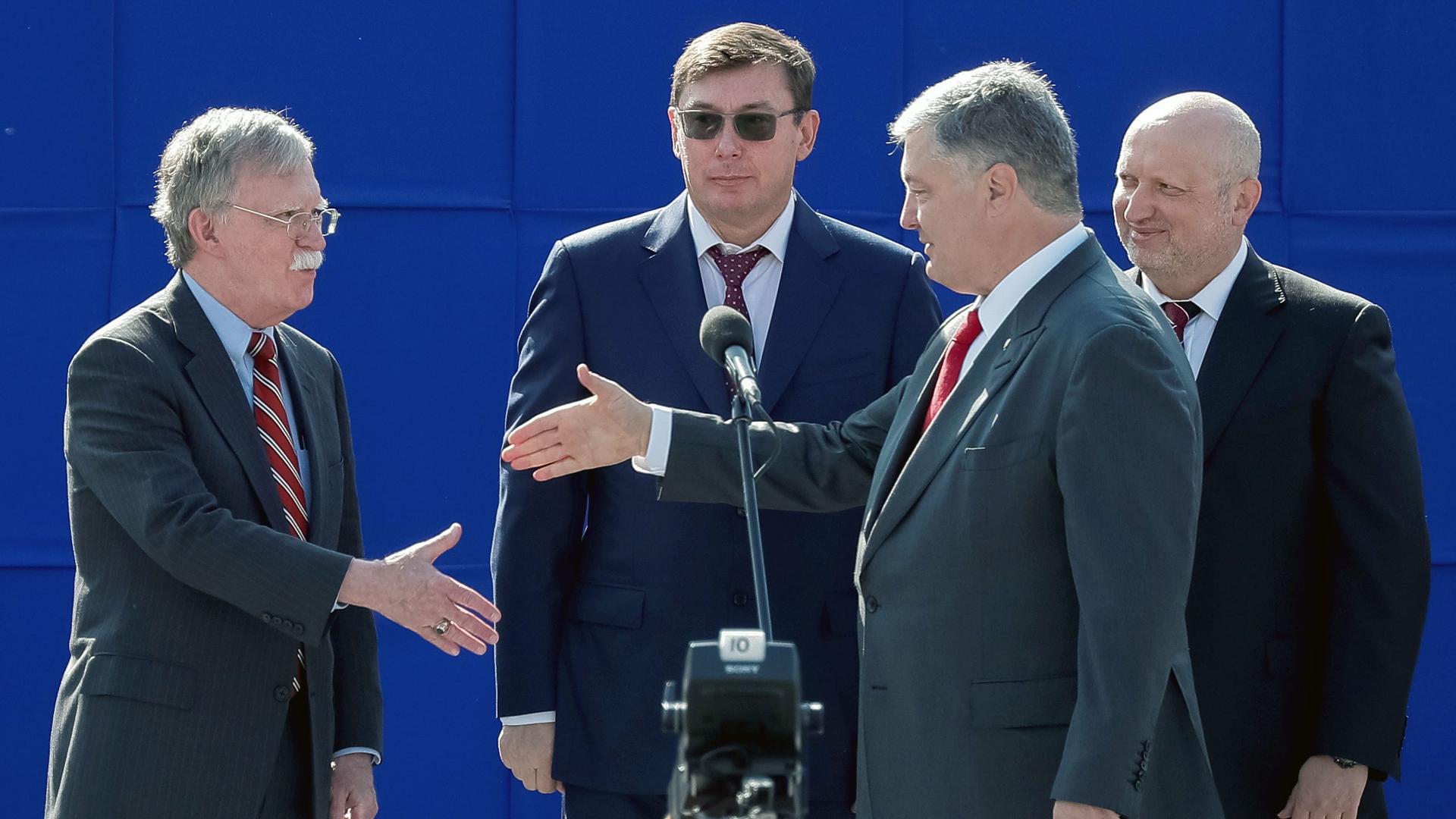Why did Donald Trump’s national security adviser want to meet with a Ukrainian billionaire?
Ukrainian President Petro Poroshenko shakes hands with US National Security Adviser John Bolton during a military parade marking Ukraine’s Independence Day in Kiev, Ukraine, on Aug. 24, 2018. During that same trip, an aide tried to set up a meeting for Bolton with steel magnate Viktor Pinchuk.
An aide to national security adviser John Bolton sought to schedule a meeting for him with Ukrainian billionaire Victor Pinchuk during Bolton’s official trip to Ukraine last August, according to new disclosure filings reviewed by the Center for Public Integrity.
The August meeting ultimately did not take place, and it’s unclear why Bolton’s aide sought it.
But Bolton and Pinchuk have financial ties dating to before Bolton joined the Trump administration: Pinchuk’s foundation had paid Bolton a combined $115,000 for his participation in two panel discussions — one during September 2017 and the other in February 2018, according to Bolton’s federal personal financial disclosure. Both panel discussions took place before President Donald Trump in April appointed Bolton as his national security adviser.
Pinchuk’s father-in-law, Leonid Kuchma, served as president of Ukraine from 1994 until 2005.
A steel magnate, Pinchuk has also drawn notice in the US for his relationship with Trump. The New York Times reported in April that the Department of Justice’s Special Counsel’s Office, led by Robert Mueller, was investigating a $150,000 donation Pinchuk made in September 2015 to Trump’s foundation. Early in his presidential campaign, Trump deemed Pinchuk a “very, very special man, a special entrepreneur.”
The payment was in exchange for a 20-minute appearance Trump made via video to a conference in Kiev, according to the Times, which reported scrutiny of the payment was part of a broader examination of foreign money flowing to Trump and his associates. On Tuesday, in an unrelated development, the Donald J. Trump Foundation agreed to shut down amid allegations that Trump had used the organization for his personal and political benefit, New York Attorney General Barbara Underwood said in a statement.
Pinchuk has also interacted with other prominent politicos, notably contributing millions of dollars to the Clinton Foundation, led by former President Bill Clinton and his wife, Hillary Clinton, the 2016 Democratic nominee for president. He was included on a list of Ukrainians sanctioned by Russia earlier this year, amid deteriorating relations with Ukraine.
The White House press office referred the Center for Public Integrity’s inquiry to Garrett Marquis, a spokesman for the National Security Council, who wouldn’t comment.
In the Nov. 29 disclosure filing, Doug Schoen, Pinchuk’s longtime US lobbyist, said that Christine Samuelian, an aide to Bolton, emailed him on Aug. 17 “inquiring as to whether Mr. Victor Pinchuk would be in Ukraine during a planned visit” by Bolton, according to a disclosure report Schoen filed with the Department of Justice late last month.
Schoen subsequently exchanged several emails with Samuelian over the next week regarding scheduling a meeting between Pinchuk and Bolton, according to Schoen’s disclosure filing.
At one point, Samuelian emailed Schoen “concerning Mr. Victor Pinchuk’s plans with respect to attending a public event.”
On Aug. 24, while Bolton was in Ukraine, Samuelian emailed Schoen “noting communications constraints while Ambassador John Bolton was in Ukraine and that his schedule had precluded meeting with” Pinchuk.
Bolton traveled to Ukraine to show US support for the country as it celebrated its Independence Day.
Schoen has represented Pinchuk since 2011, according to disclosure filings under the Foreign Agents Registration Act, and is paid $40,000 per month for the work. Schoen, a veteran political consultant and former adviser to Bill Clinton, could not immediately be reached for comment.
Natalia Vovk, a spokeswoman for the Victor Pinchuk Foundation, said in an email that the foundation brings together “global decision-makers, experts and opinion makers to discuss Ukraine’s challenges and prospects” and the goal is to “put Ukraine on the international agenda, gather support for Ukraine’s transformation according to European values, and inspire the discussion in Ukraine.”
Bolton’s 2017 and 2018 panels also included former US Secretary of Defense Robert Gates, former Speaker of the US House Newt Gingrich, Canadian Minister of Foreign Affairs Chrystia Freeland and others, she said.
Vovk said the foundation strives to attract speakers who represent different points of view in their home countries and “who can be expected to relate the content for their conversations on Ukraine to policy-making and expert circles in their respective home countries.”
